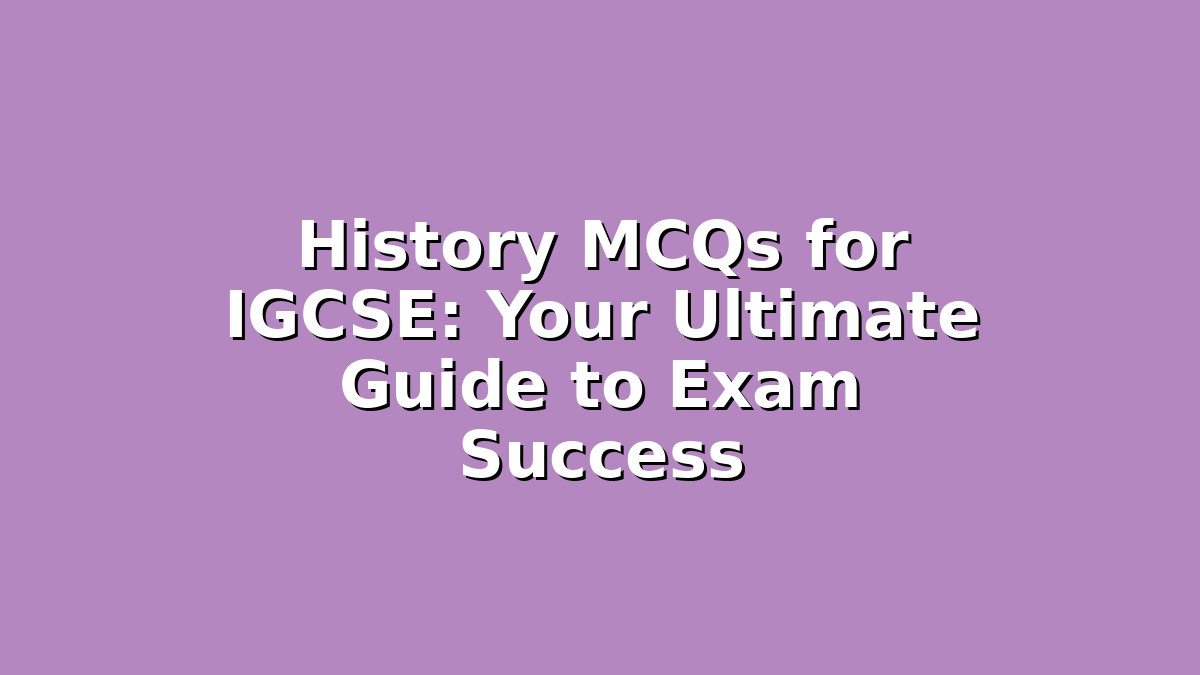Preparing for your IGCSE History exam can be both exciting and challenging. One of the best ways to boost your confidence and improve your understanding of key historical events is by practicing Multiple Choice Questions (MCQs). These types of questions not only test your knowledge but also help you develop quick thinking and exam strategy skills. In this comprehensive guide, we’ll explore how History MCQs can benefit your IGCSE preparation, provide effective study tips, and share strategies to maximize your exam performance.
Why Practice History MCQs for IGCSE?
Multiple Choice Questions are a staple in many IGCSE History exams because they assess a wide range of topics efficiently. Here’s why practicing MCQs is essential for students:
– Broad Coverage of Syllabus: MCQs often cover various topics within a single test, ensuring you review all essential areas such as causes of wars, significant historical figures, and key dates.
– Improves Recall and Understanding: Repeated exposure to MCQs helps reinforce memory. It forces you to recall facts quickly, a vital skill in timed exams.
– Develops Exam Technique: MCQs require you to analyze the question and options carefully, improving your ability to eliminate wrong answers and make educated guesses.
– Builds Confidence: Regular practice reduces exam anxiety by familiarizing you with the question format and boosting your knowledge base.
Section 1: How to Effectively Use History MCQs in Your Study Routine
To get the most out of History MCQs, it’s important to incorporate them strategically into your study plan. Here are some tips to make your practice sessions productive:
– Start with Topic-Based MCQs: Before attempting full-length tests, focus on MCQs from individual topics. This approach helps you identify strengths and weaknesses in specific areas like the Cold War, World War I, or the Industrial Revolution.
– Use Reliable Resources: Choose MCQ books and online quizzes that align with the IGCSE syllabus. Cambridge past papers, revision websites, and official study guides are excellent sources.
– Set Timed Practice Sessions: History exams are time-bound, so practice answering MCQs within a set timeframe. This builds your speed and helps manage exam pressure.
– Review Your Mistakes: After completing an MCQ set, go through each incorrect answer carefully. Understand why you got it wrong and revisit the topic if necessary. This reflection is crucial for deeper learning.
– Mix MCQs with Other Question Types: While MCQs are useful, balance them with essay practice and source-based questions to build comprehensive exam skills.
Section 2: Study Tips to Master IGCSE History MCQs
Mastering History MCQs isn’t just about memorizing facts; it involves smart study techniques that improve comprehension and retention. Here are some effective strategies:
– Create Flashcards: Use flashcards for key dates, events, and definitions. Turn these into MCQ-style questions to quiz yourself or friends.
– Summarize Topics Visually: Mind maps and timelines help you see connections between events and better understand causation and consequence — crucial for answering questions accurately.
– Practice Active Reading: When reviewing textbooks or notes, highlight important points and ask yourself potential MCQ questions based on the material.
– Discuss with Peers or Teachers: Talking through historical events with someone else can clarify your understanding and expose you to different perspectives.
– Use Past Paper MCQs: Past IGCSE papers are goldmines for practice. They give insight into the format and the common themes examiners focus on.
Section 3: Exam Day Strategies for Tackling History MCQs
On the day of your exam, your mindset and approach to MCQs can make a huge difference. Here are practical tips to help you perform your best:
– Read Questions Carefully: Avoid rushing. Read each question and all answer choices thoroughly to avoid careless mistakes.
– Eliminate Incorrect Options: Narrow down your choices by crossing out answers you know are wrong. This increases your chances of guessing correctly if you’re unsure.
– Watch for Keywords: Words like “most likely,” “primary cause,” or “immediate effect” guide you toward the correct answer by focusing on precision.
– Manage Your Time: Don’t spend too long on any one question. If stuck, mark it and return later if time permits.
– Stay Calm and Confident: Keep a steady pace and avoid stress. Remember that MCQs test your overall knowledge, so trust your preparation.
Conclusion
Using History MCQs effectively can transform your IGCSE exam preparation by reinforcing knowledge, improving exam strategy, and boosting your confidence. Start early by incorporating topic-based MCQs into your study sessions, use smart study techniques like flashcards and mind maps, and develop a calm, focused approach on exam day. With consistent practice and the right mindset, you’ll be well on your way to achieving excellent results in your IGCSE History examination. Remember, every question you practice brings you one step closer to success—keep going, and good luck!

Responses